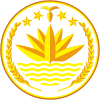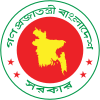Government of Bangladesh
| Government of Bangladesh | |
|---|---|
| Bengali: বাংলাদেশ সরকার | |
 · ·  | |
| Overview | |
| Established | 10 April 1971 |
| State | People's Republic of Bangladesh |
| Leader | Chief Adviser of Bangladesh (interim) |
| Appointed by | President of Bangladesh |
| Main organ | Cabinet of Bangladesh |
| Ministries | 23 advisers, 353 departments and directorates |
| Responsible to | Jatiya Sangsad |
| Annual budget | ৳797000 crore (US$67 billion) (2024–25) |
| Headquarters | Bangladesh Secretariat, Dhaka |
| Website | bangladesh.gov.bd |
| This article is part of a series on the |
| Politics of Bangladesh |
|---|
 |
|
|
|
|
The Government of the People's Republic of Bangladesh (Bengali: গণপ্রজাতন্ত্রী বাংলাদেশ সরকার — Gôṇôprôjātôntrī bānglādēsh shôrkār) is the central executive government of Bangladesh. The government was constituted by the Constitution of Bangladesh comprising the executive (the president, prime minister and cabinet), the legislature (the Jatiya Sangsad), and the judiciary (the Supreme Court). Bangladesh is a unitary state[1] and the central government has the authority to govern over the entirety of the nation. The seat of the government is located in Dhaka, the capital of Bangladesh.[2][3][4]
The executive government is led by the prime minister, who selects all the remaining ministers. The prime minister and the other most senior ministers belong to the supreme decision-making committee, known as the Cabinet. After the resignation of Sheikh Hasina in August 2024, the current interim government is led by Dr. Muhammad Yunus.
Head of state
[edit]The President is the Head of State, a largely ceremonial post. The real power is held by the prime minister, who is the head of government. The President is the commander-in-chief of the Bangladesh Armed Forces. The president is elected by the legislature every five years and has normally limited powers that are substantially expanded during the tenure of a caretaker government, mainly in controlling the transition to a new government. Bangladesh has instituted a unique system of transfer of power; at the end of the tenure of the government, power is handed over to members of a civil society for three months, who run the general elections and transfer the power to elected representatives. This system was first practiced in 1991 and adopted to the constitution in 1996.[5]
As head of the state, the president can grant pardon to a man sentenced to death penalty or lessen the punishment. In some cases, it also performs some legislative and judicial functions.
Prime Minister
[edit]The Prime Minister is ceremonially appointed by the President, commanding the confidence of the majority of the MPs. The cabinet is composed of selected ministers. The Prime Minister exercises supreme power in Bangladesh.
Cabinet
[edit]The executive administrates the country and executes the laws, passed by the legislature. It maintains the internal law and order in the country. It also maintains relationship with foreign countries. It works for defence, liberty and sovereignty of the country.
Agencies
[edit]The executive calculates the income and expenditure of the government. It also performs various public welfare services such as; education, agriculture, establishment of industry, trade & commerce, land reform, tax and revenue collection. Beside this, it also accepts and implements various development projects.
Government in Parliament
[edit]The legislature of Bangladesh is unicameral. Called the Jatiya Sangsad in Bengali, it is the parliament of Bangladesh. The Speaker presides over meetings of the Jatiya Sangsad and conducts its business in an orderly fashion. The current Jatiya Sangsad contains 350 seats, including 50 seats reserved exclusively for women and 300 seats for elected members, which are apportioned on elected party position in the parliament. The twelfth national parliamentary election was held on 7 January 2024. The recently resigned speaker is Shirin Sharmin Chaudhury, who was presiding over the tenth, eleventh and twelfth arliament. She is the first woman to have held this office.
Local Government
[edit]At the local government level, the country is divided into divisions, districts, subdistricts (Upazila), unions, and villages. The lowest level of local government representative are Local officials of union council those who are elected at the union level election. All larger administrative units are run by members of the civil service.
Finance
[edit]Economy
[edit]Taxation
[edit]Annual budget
[edit]Issues
[edit]Corruption
[edit]Separation of powers
[edit]See also
[edit]- Politics of Bangladesh
- List of office-holders in the Government of Bangladesh
- Judiciary of Bangladesh
References
[edit]- ^ "Article 1". Legislative and Parliamentary Affairs Division, Ministry of Law, Justice and Parliamentary Affairs. 4 November 1972. Retrieved 23 July 2021.
- ^ "Part VI: The Executive". Legislative and Parliamentary Affairs Division, Ministry of Law, Justice and Parliamentary Affairs. 4 November 1972. Retrieved 23 July 2021.
- ^ "Part V: The Legislature". Legislative and Parliamentary Affairs Division, Ministry of Law, Justice and Parliamentary Affairs. 4 November 1972. Retrieved 23 July 2021.
- ^ "Part VI: The Judiciary". Legislative and Parliamentary Affairs Division, Ministry of Law, Justice and Parliamentary Affairs. 4 November 1972. Retrieved 23 July 2021.
- ^ 14th Amendment, Constitution of Bangladesh, 1996.



